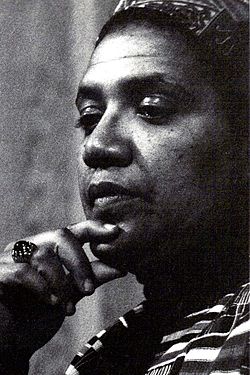Audre Lorde Quote
In the 60s, political correctness became not a guideline for living, but a new set of shackles. A small and vocal part of the Black community lost sight of the fact that unity does not mean unanimity—Black people are not some standardly digestible quantity. In order to work together we do not have to become a mix of indistinguishable particles resembling a vat of homogenized chocolate milk.
Audre Lorde
In the 60s, political correctness became not a guideline for living, but a new set of shackles. A small and vocal part of the Black community lost sight of the fact that unity does not mean unanimity—Black people are not some standardly digestible quantity. In order to work together we do not have to become a mix of indistinguishable particles resembling a vat of homogenized chocolate milk.
Related Quotes
About Audre Lorde
Audre Lorde ( AW-dree LORD; born Audrey Geraldine Lorde; February 18, 1934 – November 17, 1992) was an American writer, professor, philosopher, intersectional feminist, poet and civil rights activist. She was a self-described "Black, lesbian, feminist, socialist, mother, warrior, poet" who dedicated her life and talents to confronting different forms of injustice, as she believed there could be "no hierarchy of oppressions" among "those who share the goals of liberation and a workable future for our children."
As a poet, she is well known for technical mastery and emotional expression, as well as her poems that express anger and outrage at civil and social injustices she observed throughout her life. She was the recipient of national and international awards and the founding member of Kitchen Table: Women of Color Press. As a spoken word artist, her delivery has been called powerful, melodic, and intense by the Poetry Foundation. Her poems and prose largely deal with issues related to civil rights, feminism, lesbianism, illness, disability, and the exploration of Black female identity.
As a poet, she is well known for technical mastery and emotional expression, as well as her poems that express anger and outrage at civil and social injustices she observed throughout her life. She was the recipient of national and international awards and the founding member of Kitchen Table: Women of Color Press. As a spoken word artist, her delivery has been called powerful, melodic, and intense by the Poetry Foundation. Her poems and prose largely deal with issues related to civil rights, feminism, lesbianism, illness, disability, and the exploration of Black female identity.
